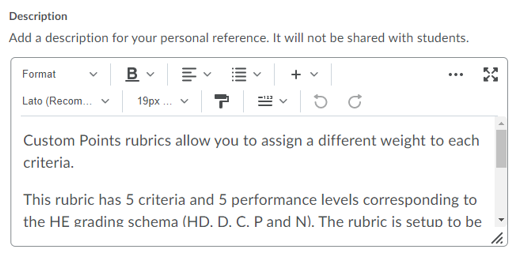Creating an Analytic Rubric
Analytic rubrics allow you to grade assessment tasks such as a Dropbox submission or a discussion post based on a pre-defined set of criteria. Levels of performance are displayed in columns and the assessment criteria are displayed in rows. Analytic rubrics may use points, customs points or text-only (no score) scoring methods. Points standardise the values for all criteria listed in the rubric. Custom points allow you to nominate different values for different criteria, giving you complete flexibility. For both points and custom points, an overall score is provided based on the total number of points achieved.
It is best that you have a fully designed rubric for your assessment before creating it within VU Collaborate.
To see a short video on How to Create an Analytic Rubric, see the video below:
To create an Analytic Rubric, take the following steps:
- Access the Rubrics
- Create a New Rubric
- Review the Rubric Properties
- Define the Rubric Performance Levels and Criteria
- Describe an Overall Score
- Review the Rubric Options
- Publish the Rubric
Additional Information
Step One: Access the Rubrics
1. From the navbar select Assessments, then Rubrics.
Step Two: Create a New Rubric
Click New Rubric.

Step Three: Review the Rubric Properties
1. Enter a Name for your rubric, using the same name as the associated assessment dropbox and grade item.
2. Your progress will be automatically saved as you go as marked by the "✔ Saved" notification.
3. Keep the default rubric properties for Type as Analytic, and Scoring as Custom Points.
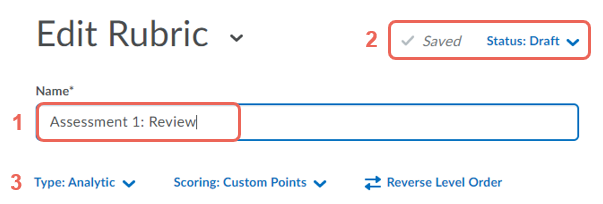
Scoring methods
- Custom Points - each criterion can have a different value (i.e. Criterion 1: 10 points and Criterion 2: 20 points)
- Points - all criteria have the same value (i.e. Criterion 1: 10 points and Criterion 2: 10 points).
- No Score is where the levels are indicated by Text Only. For example, three performance levels for a rubric can be "Poor", "Good", and "Excellent".
Step Four: Define the Rubric Performance Levels and Criteria
Performance levels
To edit the performance levels
- Select the Add new level (+ icon) to add a new performance level column
- Select the Delete bin icon to remove a performance level column
- Click the text field and enter the performance level names
- Full Marks and 5 Mid-Point levels:
Full Marks, HD (80-100%), D (70-79%), C (60-69%), P (50-59%), N (0-49%) - Full marks and 3 Mid-Point levels:
Full Marks, D/HD (70-100%), P/C (50-69%), N (0-49%)
- Full Marks and 5 Mid-Point levels:
- Use the left and right arrows to scroll to view all levels

An example of Full Marks and 5 Mid-Point levels
This rubric uses the VU Grading Scheme, with the following levels: Full Marks, HD (80-100%), D (70-79%), C (60-69%), P (50-59%), N (0-49%)

Criteria
To edit the criteria
- Enter the criterion name and description (1), add up to 500 characters.
- Select reorder option (2) to drag the criterion to a new location.
- Select actions (...) to copy or delete (3) a criterion row
- Click Add Criterion (4) to add a new criterion row
- Add the criterion value (5)
- Enter the criterion score for each level, in this example, the mid-point (7.5 points) (6), is entered for the level range (0-14.9 points)
NOTE: the left-most column (Full Marks), needs to be the same as the criterion value - Enter the description required to achieve each level of the criterion, and include the score range i.e. (0-14.9 points) (7)
- Enter initial feedback (8) for each level
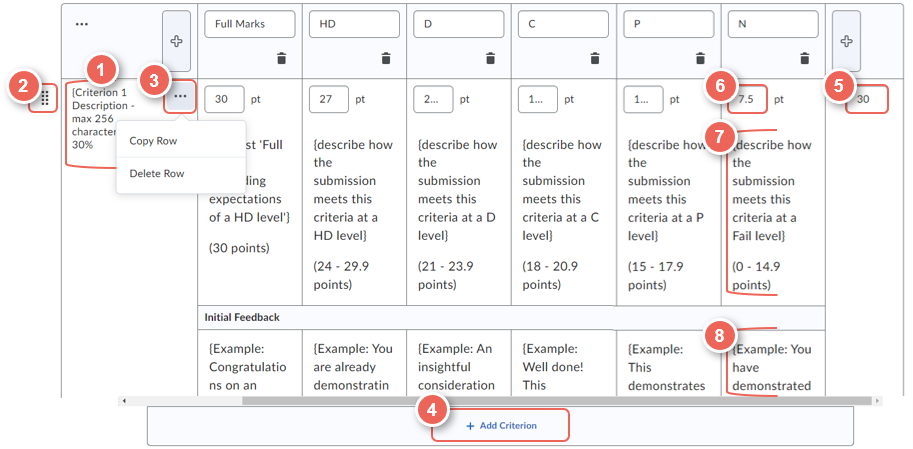
Descriptions help evaluators determine which level best reflects an assessment criterion.
The more detailed the descriptions, the more consistent evaluations will be.
When editing the descriptions, the HTML editor has the following options: Bold, Italic, bullet lists and Insert Stuff (links etc.,).
You can also click on the Fullscreen button located on the right to expand the editor. Re-click on the same button to go back.

5. If you would like to add a new criteria group to the rubric click on Add Criteria Group below the existing group.

Step Five: Prescribe an Overall Score
The overall score provides students with a level or grade that they have achieved in their assessment.
Overall Score
1. Enter the Level names. These should be the same as the level names you have used at the top of the rubric.
-
- Full Marks and 5 levels:
Full Marks, High Distinction (80-100%), Distinction (70-79%), Credit (60-69%), Pass (50-59%), Fail (0-49%) - Full marks and 3 levels:
Full Marks, Distinction/High Distinction (70-100%), Pass/Credit (50-69%), Fail (0-49%)
- Full Marks and 5 levels:
2. Enter the Start Range for your level. This should be the minimum score for the level.
3. Optionally, enter a description for achieving the performance level.

Step Six: Review the Rubric Options
In most cases, there is no reason to change the default options. To review these settings, scroll to the bottom of the page and expand the Options.

Step Seven: Publish the Rubric
For your rubric to be used with an assessment item it must be published. Ensure that all information entered is correct, and then move on to the next step.
1. Scroll to the top of the page and from the Status drop-down menu select Published.
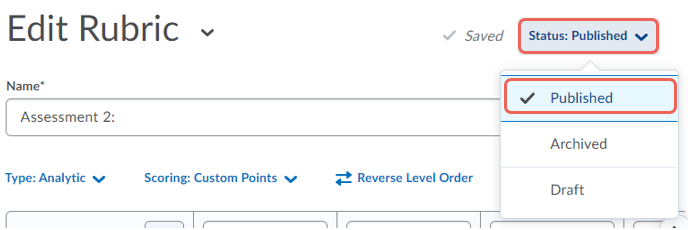

If additional changes need to be made to a published rubric, you can change the status back to draft up until it has been used for grading.
Once grading has commenced you will have to make a copy of the rubric.
Print or save as a PDF
1. From the Edit Rubric title select Preview, to open the rubric in a new window.
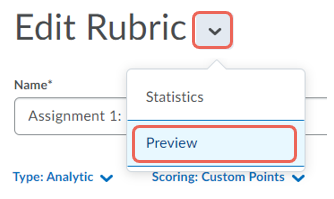
2. Click Print Rubric.

3. Select a printer or select Save as PDF.
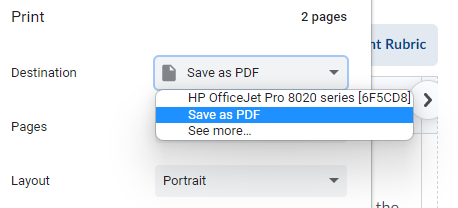
Click Save.

Points Allocation/Range Guide for an Analytic Rubric
When creating a rubric, the left-most column must include the highest value attainable.
All other levels are set at the starting point or a mid-point score.




